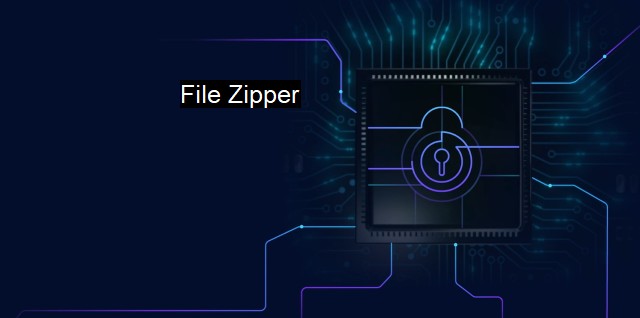What is File Zipper?
Understanding File Zippers: Benefits, Uses, and Potential Risks in Cybersecurity
File Zipper is a software used for packaging, unpacking, and compressing files. In context with cybersecurity and antivirus, a file zipper becomes a vital tool that not only saves storage space but maintains data share and a stable flow of information. Thus, understanding file zipper algorithms and systems, cybersecurity concerns, potential risks, and preemptive approaches increases antivirus efficiency and bolsters system protection against possible contagious infiltrations.This advanced technology works by detecting redundant or similar data throughout any given file set and eliminating this redundancy to leave behind a remarkably smaller version. Owing to its complex procedure, the file zipper restricts accessibility among unauthorized users, thereby adding an extra layer of security. The complex series of algorithms inhibits accidental destruction of essential data and allows seamless transmission when open connections are adequately protected. Its cybersecurity aspect thus revolves around maintaining the confidentiality, integrity, and accessibility of information within specified authorized users.
Conceptualizing file zipper functioning in correlation with antivirus protection, it is noteworthy that antivirus software largely relies upon signatures to identify malicious files. Antivirus software scans a system or an individual file, thereby identifying matched patterns with already defined malicious code. File zipper, consequently, preserves this function by compressing data that enables ongoing antivirus scanning. Files compressed and zipped through legitimate data compression software, in this respect, serve as a formidable frontline response.
File zippers facilitate the data-gathering task of antivirus software during scheduled or ad-hoc scanning, making the process efficient and less resource-intensive. It prey on file redundancy and compress bulky contents into tiny, manageable packets of data. In antivirus scanning, this renders twofold benefits; it makes antivirus solutions more effective and boosts system performance through the efficient usage of the hard disk drive, ultimately leveraging cybersecurity.
The crucial objective that file zippers inherently bring forth is thwarting malicious programs' attempts to infiltrate systems. One notable cyber threat is steganography - craftily embedding covert files within otherwise perceivably harmless carriers. Here, malicious attackers try to conceal damaging scripts and files within a larger file posed as harmless. By reducing file size to the bare minimum via compression, file zippers dismantles this hiding trick of cyber villains while maximizing available space and enhancing data transfer speed simultaneously.
Similarly, cybersecurity threats associated with resource exhaustion can also be averted through strategic file zipper application. Should an attacker decide to flood a system's storage space with irrelevant or harmful contents, file zipper would restrict the space available for attempt breaching. Thus, it acts as a shedding-knife tool, in procuring sufficient storage space, which in turn enables functionally unproblematic device handling.
Within advanced systems are file zippers integrated with antivirus which efficiently scrutinize files during the compression and unzipping process shielding against unwarranted threats. Hence, it erect a robust barricade against detrimental access from outside parties. Its user-friendly interface confirms a less technological audience leverage unsurpassed benefits from this dynamic cybersecurity enhancement product.
File zipper might seem a simple tool for reducing storage space, but its relevance scales up when correlated with cybersecurity and antivirus aspects. Actively engaging antivirus software with file zipper products appears to formulate a defensive front against cyber threats in the practically daunting and multifarious world of cybercrime. It is prudent, therefore, for developers, end users, and cybersecurity entities to comprehend, appreciate, and hence adopt file zipper in pursuit of a securer digital data transmission, storage, and sharing landscape. This consequentially minimizes the jeopardy dealing with internet security and elevates the status of antivirus detection.

File Zipper FAQs
What is a file zipper?
A file zipper is a software application that enables users to compress and decompress files. Using compression algorithms, file zippers reduce the size of large files to save storage space and make them easier to share.How does file zipper enhance cybersecurity?
File zippers can enhance cybersecurity by compressing files and adding password protection to ensure confidentiality. This makes it harder for hackers to access sensitive information, as they would first need to decrypt the zip file to access the contents.Can file zippers protect against viruses?
While file zippers are not designed to protect against viruses, some offer virus scanning capabilities. These zippers will scan compressed files for known viruses before decompressing them, reducing the risk of accidentally infecting your device.Can I use any file zipper or do I need a specific one for antiviral purposes?
Any file zipper can be used for antiviral purposes, but it is recommended to use a trusted and reliable file zipper with built-in virus scanning capabilities. This will offer an added layer of protection against potential threats.| | A | | | B | | | C | | | D | | | E | | | F | | | G | | | H | | | I | | | J | | | K | | | L | | | M | |
| | N | | | O | | | P | | | Q | | | R | | | S | | | T | | | U | | | V | | | W | | | X | | | Y | | | Z | |
| | 1 | | | 2 | | | 3 | | | 4 | | | 7 | | | 8 | | |||||||